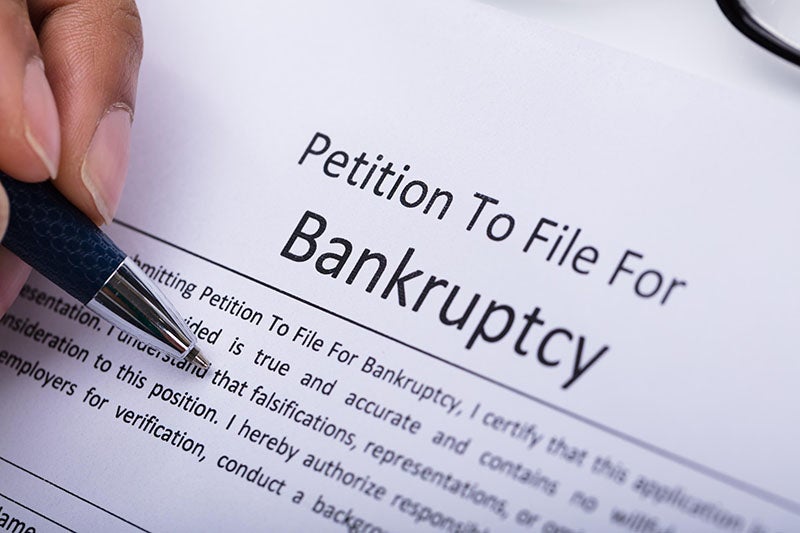-
Chapter 11, Subchapter V Bankruptcy

Filing Chapter 11 bankruptcy allows businesses to remain open and in operation while repaying creditors over a set period. However, pursuing this route is generally too expensive and complicated for most small business owners. Therefore, the Small Business Reorganization Act created Subchapter V to eliminate numerous Chapter 11 requirements. Thus, the addition makes reorganization bankruptcies more attainable for small businesses.
Filing for Bankruptcy as a Business Owner
There are several different bankruptcy options to seek debt relief if you’re a business owner. You can consider filing for Chapter 7 or Chapter 11 bankruptcy.
Note – If you run your company as a sole proprietorship, you can file Chapter 13 in your name and include your business debts in your plan.
Chapter 7 bankruptcy is known as “straight bankruptcy.” It aims to eliminate most, if not all, of your debt in exchange for your property. You’ll be obligated to sell your business assets in their entirety, pay creditors, and close your business. However, you’ll be debt-free.
Chapter 11 bankruptcy is known as “reorganization bankruptcy,” typically involving organizations, small businesses, corporations, or partnerships with a great deal of debt. You can remain open while you negotiate payment plans with your creditors.
What Is Subchapter V?
Subchapter V was added to Chapter 11 of the US Bankruptcy Code and went into effect in 2020. The subchapter was intended to make bankruptcies involving reorganizations more accessible for small businesses.
Who Can Qualify for Subchapter V?
To qualify for Chapter V bankruptcy, businesses must:
- Engage in business or commercial activities
- Ensure their unsecured and secured debts don’t exceed $2,725,625
- Have a minimum of 50% of business debt result from business activities
- Not include debt owed to company insiders
Note – You don’t qualify for Chapter V if your primary business activity is owning and operating a single property.
Advantages of Subchapter V
Subchapter V has many advantages, including removing many Chapter 11 requirements. The following is a list of benefits associated with filing for this subchapter.
- Eliminating the absolute priority rule
Absolute priority is a rule in corporate bankruptcies that determine what order of payment will go to creditors and shareholders. For example, senior creditors are paid before junior creditors. However, there isn’t an absolute priority rule when filing Subchapter V. - Remaining open operationally
Similar to the traditional Chapter 11, you’ll be able to keep your business open while repaying creditors
Note – While on the plan, you’ll have to pay your unsecured creditors the total amount of your disposable income. - No disclosure is required
- Installments of expenses paid
Instead of paying the administrative expenses in their entirety, you can settle your costs in installments. - Plan exclusivity
The debtor alone may file Subchapter V, and there isn’t an exclusivity period expiring after a certain period. - Reduced administrative expenses
- Increased protection of the automatic stay
An individual may file a second case within two years of the prior case, staying the actions of creditors pursuing the debtor. - Easier counsel retention
- There is no vote required to confirm the plan
The debtor can establish a cramdown plan with no approval from creditors. - Modification of specific mortgages
- Post-confirmation plan alterations
After confirmation, only the filer may modify the plan. - The discharge
The debtor can obtain a discharge on the effective plan date, given consensual confirmation provisions. - No limits in the modification of motor vehicle loans
Disadvantages of Subchapter V
While there are numerous advantages to filing Subchapter V, there are several disadvantages, including:
- Limited eligibility, as stated earlier
- Plan deadlines where the individual has 90 days to file a plan
- Remedies upon plan default, which says the program must provide appropriate corrections if payments aren’t made
- Limits on cash collateral use
- Mandatory trustee appointment
- Required status conference
- Dedicated projected disposable income to pay creditors
Subchapter V simplifies Chapter 11 for small businesses. But the process can still be complex. A knowledgeable lawyer can help you thoroughly understand the proceeding and ensure you achieve the greatest possible outcome. At Mummert Law, we’re available for a consultation, at which time we’ll sit down together, evaluate your position, and determine the best way to proceed. So don’t go it alone when it comes to bankruptcy. Make your appointment with Mummert Law today!
-
Why is Your FICO Score Important?

If you want to finance anything, you need a good credit score. You could pay thousands of dollars in high interest with a poor credit score compared to someone with good or better credit.
What is Your FICO Score?
There are three main credit bureaus: Equifax, Experian, and TransUnion. The most common one used by lenders and other companies is Equifax. The Fair Isaac Corporation created the FICO score about thirty years ago as an industry-standard number of score creditworthiness.
When you take out a loan, your credit score is one of the most significant factors used to determine eligibility, how much you can finance, and your interest rate. Utility companies, cell phone providers, and landlords use your credit score to determine eligibility, if you owe a deposit, and how much you owe. In Maryland, insurance companies can also use your credit score as a factor when determining your auto insurance premium.
The higher your credit score, the less risky it is for a lender to finance your loan. This translates to a low-interest rate, fewer fees, and more available credit. People with a high credit score have more advantages, commanding lower payments and their choice of lenders. For rentals, utilities, and cell phone plans, those with high credit scores may be able to forgo a security deposit or secure a better apartment in a more desirable neighborhood than someone with a lower credit score.
What is a Good FICO Credit Score?
A FICO credit score is a three-digit number between 300 and 850. According to Experian data, The average U.S. credit score is 711 as of 2020. Credit scores fall into ranges and determine your creditworthiness.
- Exceptional: 800 and over
- Very good: 740-799
- Good: 670-739
- Fair: 580-669
- Poor: <580
As you can see, the average credit score falls into the Good range. Anything better than average is your goal if you want the best choice in lender, interest rate, and loan terms.
How Can I Build Credit Without Taking on Debt?
You can’t build a credit score if you don’t use credit. You can use two strategies to build your credit and gain a good or better score.
The first is getting a secured credit card. You deposit in the bank, and they offer you a credit card with the deposit amount as your credit line.
Another way is to get a credit-builder loan, which works the same way. You deposit money into a savings account or certificate of deposit (CD). After making on-time payments for a length of time, you get your money back. You can usually get a credit-builder loan from a credit union or community bank.
How to Build Good Credit Habits
Getting a high credit score is easy when you’re first starting. But it’s even easier to create bad habits that translate to poor credit scores. Here are a few tips for building great credit habits:
- Always pay your bills on time or early.
- Don’t carry balances by paying your bills in full.
- Use your credit cards regularly, but try to stay under 30% of your credit limit.
- Don’t close accounts because it can negatively impact your credit score. Just stop using them.
Building an excellent FICO score is an essential part of your financial strategy. If you are overwhelmed with credit obligations, and your FICO score is suffering, contact Mummert Law for a consultation to see if bankruptcy is a good option for you!
-
Is an 84-Month Car Loan a Good Idea?

If you’re in the market for a new or used car, you may need a loan to buy it. When you work with a lender for financing, you can usually name your monthly budget, and they’ll do what it takes to meet that number or get just below it.
One way lenders do this is to extend the loan period. This is how we have gotten to 84-month car loans. When you finance a car with an 84-month auto loan, the purchase price and finance charges are spread over seven years.
Is an 84-month car loan a good option for you? Consider the benefits and drawbacks of a seven-year auto loan before signing on the dotted line.
Benefits of an 84-Month Car Loan
Low Monthly Payments
The longer you spread out the cost, the lower your monthly payments. An 84-month car loan can make it manageable for buyers on a tight budget to afford a new car. However, this could also signify that the vehicle you’re buying exceeds what you can afford. You may be better off choosing a cheaper model.
Low-Interest Rates
When interest rates are low — as they have been for some time — borrowing for a more extended time can make sense. How much you pay in interest over the loan term depends on the final cost of the car and the interest rate for which you qualify. If you have a lot of debt but can qualify for a low rate, accepting a longer loan term could make sense to tackle the rest of your high-interest debts.
Drawbacks of an 84-Month Car Loan
While there are a few benefits to taking out an 84-month loan, there are also some drawbacks.
Cars Depreciate Quickly
While owning a home is an appreciating asset, meaning the value increases over time, a car is the opposite. New cars lose some of their value the minute you drive them off the lot, and the value continues to decrease as the mileage and age increase.
With an 84-month auto loan, you could be underwater on the loan by the end when you owe more than the car is worth. Suppose you have negative equity and get into an accident where the vehicle is a total loss or decide to sell it before paying the loan in full. In that case, you will still owe on a vehicle you can’t drive anymore. You may be able to roll the negative equity into a new car payment, but that would mean you’re already underwater on a brand-new car.
The Loan Outlives the Warranty
Depending on the car manufacturer, the car loan may outlive the warranty. In this case, you’ll still be paying for the car payment and have to shoulder more of the cost of repairs. The older your car gets, the more it typically costs to repair, making your vehicle cost more than your budget allows.
Higher Cost Overall
The longer you pay on a loan, the more you pay in interest. For instance, you’ll pay about $1,300 in interest on a $20,000 car with a 2.5% interest rate. The same loan over 84 months would amount to about $1,820, over $500 more.
Circumstances When an 84-Month Car Loan is a Good Option For You
While an 84-month loan may not be the best solution for everyone, sometimes you’re on a tight enough budget to warrant it. Here are some reasons an 84-month car loan is a good option for you:
- You have an extended warranty beyond the loan term.
- There is no prepayment penalty.
- This loan term is the only one that fits into your budget.
- It allows you to afford a more reliable or safer car.
- You have higher interest debts and can qualify for a low-interest car loan.
As with most financial agreements, be cautious and weigh the advantages and disadvantages of your options. If you are overwhelmed by debt that makes it hard to buy a new vehicle, contact us for a consultation to see what advice we can offer.
-
Choosing The Right Bankruptcy Lawyer

Filing for bankruptcy can be distressing, emotional, and complex, and it can also be a time-consuming undertaking. Moving through the process of seeking debt and financial hardship relief can take months or years to accomplish. However, a knowledgeable bankruptcy lawyer can help make all the difference. Their understanding of the legalities can simplify the approach, give you peace of mind, and help you avoid problems throughout the process. But it’s vital to choose the right lawyer for you!
What Is Bankruptcy?
Bankruptcy helps debtors relieve financial stress and problems that they may face. Typically, consumers file for Chapter 7 or Chapter 13 bankruptcy, designed to give debtors a fresh start. On the other hand, businesses and organizations can file for Chapter 7 or Chapter 11 bankruptcy. Bankruptcy lawyers aim to assist individuals and companies throughout the filing process.
What Are Bankruptcy Lawyers?
Bankruptcy lawyers typically specialize in consumer or commercial bankruptcy. Both transactional and litigation affairs are involved with bankruptcy practices.
Benefits of Hiring a Bankruptcy Lawyer
A knowledgeable bankruptcy lawyer can significantly impact filing and your overall achievement of debt relief because they:
- Understand the legal process
- Can improve your chances of success
- May help you save money over time
- Provide you with peace of mind
- Can assist with avoiding problems throughout the process
- Can help you keep real estate or assets that you own
- Make a complicated process easier for you
However, picking the right attorney to experience the above benefits is vital.
Choosing the Right Bankruptcy Lawyer
How do you choose which attorney is best suited for your situation? You can begin by following these steps:
1. Look at reviews
Today’s consumers often rely on reviews before making any purchasing decision. So, as you seek a bankruptcy lawyer, consider reviewing reviews for attorneys in your area.
The AVVO rating evaluates an attorney’s background, reveals state bar association information, and showcases details about other legal professional organizations. You can utilize this as a research tool when looking for reviews.2. Ensure they have experience in business and financial matters
Finding a bankruptcy lawyer with extensive knowledge and a considerable background in bankruptcy law, business, and financial matters is critical. These attorneys will have an in-depth understanding of the bankruptcy process. They will be able to best assist you with providing reliable consultation. They’ll also be able to keep you on track throughout the proceeding.3. Participate in a consultation
Most law firms and attorneys provide free consultations. These meetings will allow you to ask questions and examine if you and their team are a good fit. This consultation may be your first chance to speak with the bankruptcy lawyer. You’ll be able to determine whether you believe they can help you and your family find relief. In addition, notice whether they discuss various alternative resolutions, as they should present the most beneficial way to overcome your financial situation.4. Take note of their passion or energy
A bankruptcy attorney who is passionate and focuses their energy on helping you find financial relief is critical to the positive achievement within your case. And don’t be hesitant to ask why they chose to specialize in financial or bankruptcy law. Consider looking for a connection with their purpose and why they aim to help you and your family.5. Make sure they take the time to listen and understand you and your situation.
Every bankruptcy case is unique. And walking through the process can be distressing and emotional. A lawyer who hears and understands you can help ensure you feel confident and secure throughout the filing process. In addition, you’ll have a great deal of contact with your lawyer. So, you must find one with whom you’re comfortable.The mere thought of filing for bankruptcy and finding a lawyer can be intimidating. We understand, and that’s why we’re here to help make your journey to achieving debt relief as easy as possible. At Mummert Law, we’re available for a consultation. At this time, we’ll sit down together, evaluate your position, and determine the best way to proceed. So don’t go it alone when it comes to bankruptcy. Make your appointment with Mummert Law today!

